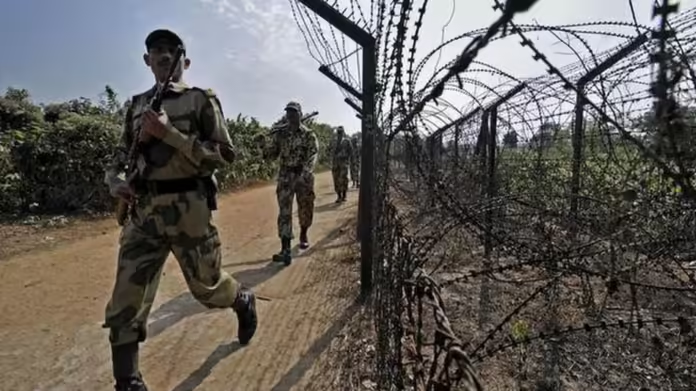The Border Security Force (BSF) stationed in Tripura has detained a significant number of Bangladeshi and Rohingya nationals in the ongoing efforts to address illegal immigration and enhance regional security. Since the beginning of the year, 623 Bangladeshi and Rohingya individuals have been apprehended, marking an intense crackdown on cross-border infiltration. In addition to these arrests, BSF officials report the detention of 52 local touts suspected of assisting illegal immigrants. The BSF attributes this outcome to its tightened security protocols, increased vigilance, and targeted surveillance along the India-Bangladesh border, which spans 856 kilometers in Tripura.
These apprehensions have highlighted the complex challenges of managing illegal immigration in a region with porous borders. The BSF has increased patrols and set up additional checkpoints to monitor and control the inflow of unauthorized individuals into Indian territory. Advanced technology, including night-vision cameras and drones, has enhanced surveillance capabilities along vulnerable border sections. This technology helps detect illegal crossings, and BSF officials say it has proven to be a valuable tool in intercepting potential threats in real time.
The high number of apprehensions has caught the attention of lawmakers, and a recent meeting addressed the issue of ongoing infiltration. Tripura Member of Parliament (MP) Rebati Tripura met with Inspector General of BSF Tripura Frontier, Sh. Sumit Sharan, to discuss the matter in depth. The discussion emphasized the strategic importance of border security in the northeastern region, with both leaders expressing a commitment to tackle the increasing inflow of illegal immigrants through stricter control measures.
During the meeting, MP Rebati Tripura expressed concern over the rising number of illegal immigrants, noting the broader implications for local communities. He highlighted the strain on local resources and security and discussed measures to support BSF personnel stationed on the frontlines. Reaffirming the government’s commitment, he also mentioned the need to curb human trafficking networks and break down the organized operations that enable illegal immigration.
The detention of 52 touts adds a critical layer to the ongoing security operations. These touts, often operating within local communities, are suspected of being instrumental in aiding and abetting illegal entry. They reportedly charge substantial amounts to smuggle immigrants into Indian territory, thereby facilitating a network that challenges the integrity of border control efforts. In response, the BSF has focused on both preventing unauthorized entry and dismantling the support networks that enable it.
Apart from routine security measures, the BSF has deployed additional personnel and conducted awareness campaigns within border communities to garner local support. BSF spokespersons suggest that cooperation from border residents can be a powerful tool in identifying and reporting suspicious activities. Increased community engagement has been essential to the BSF’s strategy, particularly in remote areas where illegal crossings are more prevalent.
Local support has been instrumental in aiding BSF operations, as the residents’ familiarity with the terrain provides additional insights. A local resident shared that the increased presence of BSF personnel has given the community a greater sense of security. Despite the challenges of language and resources, the BSF continues to build trust within these communities, further empowering local residents to report illegal activities.
This recent crackdown underscores a deeper security concern in Tripura, where the demographic impact of unauthorized immigration has led to a re-evaluation of border policies. Officials argue that while the primary task of the BSF is to protect the borders, support from local government agencies is equally crucial in addressing social and economic issues arising from illegal immigration. In line with this view, MP Rebati Tripura has assured the BSF of his continued support and plans to address the matter at the parliamentary level, seeking further resources and legislative support.
The situation in Tripura is part of a larger issue affecting India’s northeastern states, which face unique challenges due to their shared borders with neighboring countries. Tripura’s strategic location along the border makes it particularly vulnerable to infiltration. To address this, officials aim to implement more robust policies that consider both immediate security needs and long-term socio-economic impacts. The coordinated efforts between local authorities and the BSF reflect a growing awareness of the region’s challenges and a determination to address them comprehensively.
As the situation evolves, BSF personnel continue their duty along the border, mindful of both the risks and the essential role they play in safeguarding national security. For local communities in Tripura, the recent actions provide reassurance that their concerns about illegal immigration are being taken seriously. Meanwhile, as the BSF intensifies its operations, the focus remains on creating a secure and stable environment, with a commitment to uphold the sovereignty of the region.


